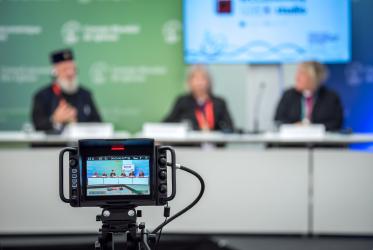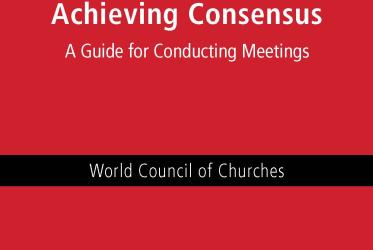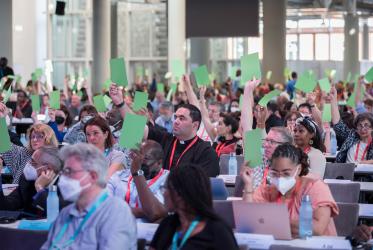1. The following procedures for dealing with public issues (amended to reflect the new WCC structure) were affirmed by the Central Committee in 1985:
1.1. Recommendations on topics/situations for action by the Central Committee under "Public Issues" are made by the International Affairs, Peace and Human Security staff to the General Secretariat after consultation with concerned Council teams. Regional task forces are also consulted.
1.2. These recommendations are brought to the Staff Leadership Group (SLG) where they are amended as required and finalized.
1.3. International Affairs, Peace and Human Security staff prepares notes on the topics recommended, providing information and rationale for action by the Central Committee. The Executive Committee, after discussion, makes the proposals to the Central Committee. It also nominates the membership of the Public Issues Committee for election by Central Committee.
1.4. The General Secretary presents the proposals to the Central Committee at an early session of the Committee, briefly explaining the procedure and referring them to the Public Issues Committee.
1.5. The Public Issues Committee, with the assistance of staff, prepares the appropriate actions or statements. (These may include: study documents or appeals addressed to the attention of the churches, declarations on situations/issues, representations and appeals to governments and inter-governmental bodies, pastoral letters, etc.).
2. The Executive Committee, February 1989, adopted the following additional procedures:
2.1. Every effort should be made to reduce the number of public issues on which statements are made by the Central Committee.
2.2. The Central Committee should be informed in advance of the procedures. It should be emphasized that a public statement by the Central Committee is only one among several ways of dealing with such matters.
2.3. In presenting the public issues for action, the General Secretary may indicate ongoing actions, especially in international affairs. Written information may be provided on actions relating to major issues in the period between Central Committee meetings.
2.4. It should be made clear that resolutions related to programmes should be brought through the Programme Committee or Policy Reference Committee II, as appropriate.
2.5. Proposals from members of the Central Committee (after the General Secretary has presented the proposals from the Executive Committee) may be considered by the Public Issues Committee and, on its recommendation, the officers may take the decision as to which among the proposals should be taken up under Public Issues, which should be referred to another appropriate committee, and which should be acted upon by the officers or the General Secretary directly.
Such proposals may be received orally during the plenary session in which the public issues are announced, or in writing to the moderator of the Public Issues Committee within 24 hours of the announcement. The officers will inform the Central Committee of their decision about how to process these proposals as early as possible in the meeting.
2.6. If in the opinion of the officers proposals for Public Issues or for any amendments deserve further study or consultation, or are considered to be at variance with the policies and procedures of the WCC, the moderator may rule that another course of action be followed.
2.7. The first draft of each statement should be circulated to the Central Committee when they are available and opportunity provided for written comments. Amendments and suggestions should be given to the Public Issues Committee for its consideration within a stipulated time.
2.8. At a later session, the Public Issues Committee should bring the revised drafts to the plenary, explaining any changes made, and giving reasons why any proposals for change have not been retained. Each statement should then be presented to the Central Committee for adoption. Proposed amendments should be presented to the Moderator in writing to facilitate consideration of revised drafts.



